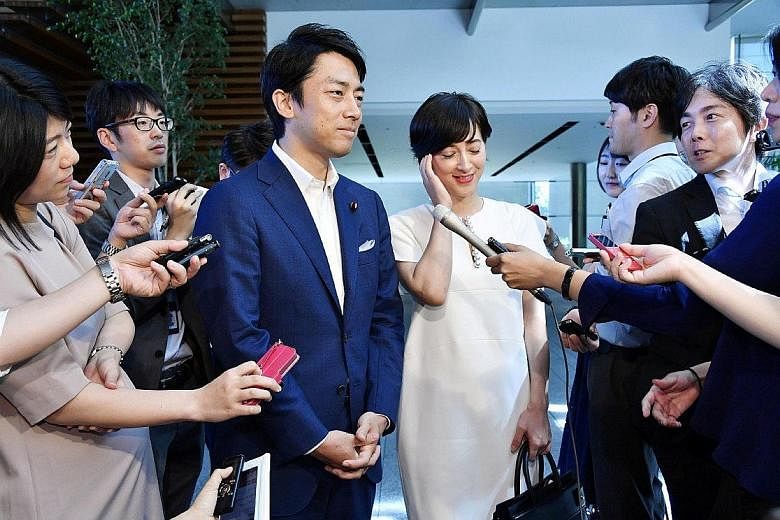Japan's Environment Minister Shinjiro Koizumi will qualify for paternity leave when his first child is born next year, but the question is whether he will claim even part of this entitlement.
When the 38-year-old last month mooted the possibility that he might take this leave, he incurred a torrent of criticism - including from within his own Liberal Democratic Party - that prompted him to describe Japan as "old-fashioned" in its backward thinking.
Two cases before the Tokyo District Court have also cast a harsh glare on the issue of patahara (paternity harassment), by which new fathers get sidelined at work when they take time off after their children's birth.
For all of Mr Koizumi's detractors, he is best placed to lead by example in a country struggling to lift its birth rate. This year will likely see fewer than 900,000 new babies - a record low.
This is despite Japan having one of the world's most generous parental leave packages. New parents are legally entitled to leave of up to a year, and are paid up to 80 per cent of their wages through government benefits.
But not more than 6.2 per cent of new dads took even a fraction of their paternity leave in the fiscal year ending in March. And over 70 per cent of those who did were back at work within two weeks.
This trend is emblematic of a corporate culture that focuses on face-time, frowns upon absences from work and penalises those who do not fall in line.
In one of the lawsuits, a Japanese father who works for major sportswear label Asics says he is suffering retribution for having taken time off when his two boys were born.
The 38-year-old was in marketing until he took parental leave for the first time, and was redeployed to laborious tasks in a warehouse after his return. He hurt his shoulder, and was reassigned to do menial administrative tasks. He told the court that his employer accused him of "not being a team player".
In the other case, Mr Glen Wood, 49, a Canadian single father who has been working in Japan for three decades, is fighting to get his job back as head of equity sales at brokerage giant Mitsubishi UFJ Morgan Stanley.
He said he was sidelined despite having produced results, and then fired last year after speaking up against his treatment.
He said his initial application for paternity leave was rejected as there was no precedent. His son was born six weeks premature in Nepal and had to be warded in the intensive care unit.
That was the start of a prolonged ordeal with the company, he said. Among other things, he was made to take a DNA test to prove that he was the father, and when he returned to work, he was shut out of strategy meetings and consigned to minimal work.
The lawsuit, filed in 2017, had its first hearing in open court this month. His former boss Akihiro Kiyomi, and Mr Chiharu Abe, who took over his role, said they reduced his responsibilities because they wondered if he could handle the workload - a decision that was never discussed with Mr Wood.
Mr Wood, who has about 16,000 signatures in an online petition against patahara, told The Sunday Times: "If you try to be kind to someone when they don't want the kindness, then that is harassment."
Speaking in fluent Japanese, he told the court: "I was being called useless, that I couldn't be trusted, that I was unreliable." He said his complaint to the human resources department yielded what he felt was a bogus open-and-shut internal probe, given that nobody spoke to his boss about the matter.
Another person who testified was Mr Shunsuke Fujii, a former vice-president at Mitsubishi UFJ Financial Group (MUFG) Securities in New York, who has settled his own harassment suit with the firm over racial discrimination. The Japanese-American was chastised by his Japanese superiors and colleagues for his inability to speak and write the language.
He said: "It was no secret that Glen was a special target. After Glen returned from paternity leave, Chiharu Abe called me to find flaws with his leadership and asked me for specific instances where he failed to deliver on his targets."
In another affidavit presented in court, MUFG's harassment hotline was described as "nearly a Stalinist contrivance, the main effect of which was to ensnare and oppress victims".
The term "harassment" should not mask the fact that it involved human rights abuses, Mr Wood told The Sunday Times, adding that he was ready to appeal if he were to lose the case.
And if he wins - or gets a settlement - he intends to launch a fund to support victims.
"You can't say to fathers that they have the right to take a year off, and then not allow them to exercise that right," he said. "Corporations should not be above the law."

